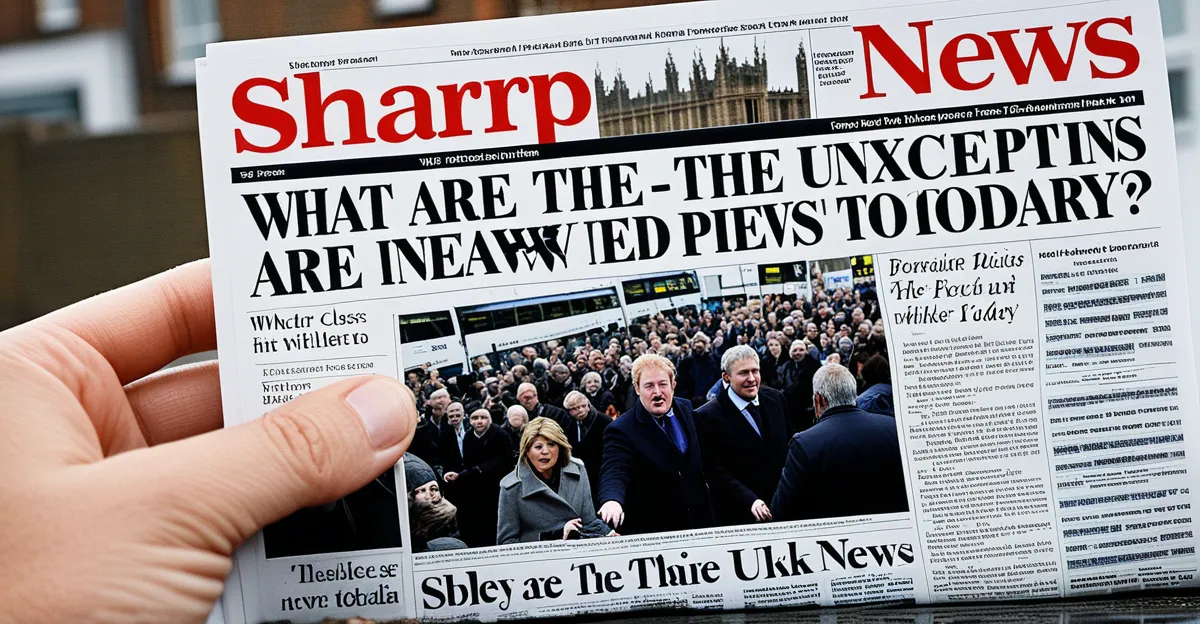Rapid Shifts in UK Political Landscape
Recent UK politics trends reveal a wave of unexpected party alliances and high-profile political resignations, dramatically altering government dynamics. For instance, coalition formations between traditionally opposing parties have reshaped parliamentary stability, forcing rapid adaptation in policy-making. These alliances often emerge as strategic responses to surprising election outcomes, which disrupted previously predictable voting patterns.
One notable example involved smaller parties gaining critical seats, shifting the balance of power and influencing key legislative decisions. This shift has led to changes in government priorities, impacting sectors from healthcare to economic regulation. Political analysis highlights that such outcomes challenge established party dominance and compel a reevaluation of campaign strategies.
In the same genre : How are cultural shifts impacting UK social norms?
Public sentiment has also been visibly affected, with polls showing fluctuations in trust towards political leadership. The unexpected turns cause both uncertainty and engagement, prompting increased political discourse among citizens. Experts argue this period of volatility may catalyze reform but requires careful navigation to maintain democratic stability. Overall, the recent developments in UK politics underscore a landscape in flux, where resilience and adaptability become essential for governance and public confidence.
Rapid Shifts in UK Political Landscape
Recent UK politics trends have been marked by unforeseen party alliances and high-profile political resignations, significantly disrupting traditional government dynamics. These sudden shifts often arise from surprising UK news relating to election results, where smaller or previously marginal parties secure crucial seats. This fragmentation compels major parties to form strategic coalitions, which, while stabilizing governance temporarily, bring ideological compromises impacting policy direction.
Also read : How are cultural shifts impacting UK social norms?
Political analysis reveals that these changes cause rapid recalibration in legislative priorities, affecting everything from social welfare to economic regulation. Experts observe that such transformations challenge long-standing party dominance and force leaders to be more responsive to a wider spectrum of public demands. The unpredictable nature of these government changes also fuels public debates, influencing citizen engagement and trust.
In terms of reaction, many analysts stress that while volatility may risk short-term instability, it could also drive necessary reforms. They emphasize vigilant oversight and adaptive policymaking to harness this fluidity beneficially. For example, unexpected resignations often prompt internal party reforms, stimulating fresh leadership ideas. Overall, these dynamics highlight the complexity and evolving nature of UK politics, demanding both flexibility and strategic vision from all stakeholders.
Rapid Shifts in UK Political Landscape
Recent UK politics trends centre on unexpected alliances and political resignations that have unsettled government dynamics. When surprising UK news breaks about coalition formations between unlikely partners, it signals deep shifts in parliamentary strategy. These rapid government changes often follow election results where smaller parties gain pivotal seats, forcing major parties into coalition governments that require compromise and recalibrated policy agendas.
Political analysis emphasizes that such alliances, while stabilizing governance, trigger swift adjustments in priorities across healthcare, economic regulation, and social welfare. Analysts underscore that government changes reshape traditional party power balances, challenging leaders to respond more flexibly to public demands. For example, political resignations can provoke internal party reform and leadership contests, directly influencing legislative focus.
Public sentiment reacts variably to these developments. Polls often fluctuate as citizens process surprising election outcomes and the evolving landscape. Experts suggest that although these government changes introduce volatility, they also create opportunities for reform and renewed political engagement. Thus, UK politics trends reflect a dynamic environment where adaptability becomes crucial for both politicians and the electorate amid continuous political analysis.
Rapid Shifts in UK Political Landscape
Recent UK politics trends are defined by an increase in unexpected party alliances and political resignations, significantly altering government dynamics. These government changes often follow surprising UK news of election results where smaller parties capture pivotal seats. This reshapes parliamentary power balances and forces coalition governments, demanding compromise and realignment of policies.
Political analysis indicates that these alliances impact policy direction across key sectors such as healthcare and economic regulation. For example, when parties with differing ideologies form coalitions, policy agendas must be quickly adjusted to maintain governance stability. Additionally, high-profile resignations often trigger internal party reforms, which can recalibrate leadership strategies and legislative focus.
Reaction from political analysts highlights both risks and opportunities. They caution that sudden shifts may introduce short-term instability but can also pave the way for reform and adaptability. Public sentiment fluctuates as citizens react to such developments, affecting trust and engagement levels. Overall, continuous political analysis reveals that the evolving UK landscape requires flexibility and strategic anticipation by policymakers to manage these rapid transitions effectively.
Rapid Shifts in UK Political Landscape
Recent UK politics trends reveal that unexpected party alliances and high-profile political resignations are continuing to reshape government dynamics. These government changes often stem from surprising UK news surrounding elections where smaller parties secure pivotal seats, forcing larger parties into complex coalition arrangements. Such alliances require ideological concessions, resulting in significant recalibration of policy priorities across sectors like healthcare and economic regulation.
How do surprising election results affect policy? They compel policymakers to negotiate and blend disparate party platforms, often slowing decision-making but also encouraging more inclusive governance. Political analysis emphasizes that these shifts disrupt traditional party dominance and drive the evolution of legislative agendas.
What impact do political analysts note on public sentiment? Analysts highlight that unpredictable government changes cause fluctuating trust and heightened public engagement. Citizens react strongly to unexpected resignations and coalition formations, which fuels political debate and scrutiny. However, experts argue this volatility can stimulate reform if managed with strategic foresight.
In summary, current UK politics trends underscore a landscape marked by instability yet ripe with opportunity, demanding flexibility from politicians and attentiveness from the electorate to navigate ongoing challenges effectively.





